Breakthroughs in Mimetic Theory
Edited by William A. Johnsen
Sacrifice
Ren Girard
Translated by Matthew Pattillo and David Dawson
Michigan State University Press
East Lansing
Copyright 2011 by Ren Girard
Le sacrifice copyright 2003 Bibliothque Nationale of Paris
This series is supported by Imitatio, a project of the Thiel Foundation.
 The paper used in this publication meets the minimum requirements of ANSI/NISO Z39.48-1992 (R 1997) (Permanence of Paper).
The paper used in this publication meets the minimum requirements of ANSI/NISO Z39.48-1992 (R 1997) (Permanence of Paper).
Michigan State University Press
East Lansing, Michigan 48823-5245
Printed and bound in the United States of America.
17 16 15 14 13 12 11 1 2 3 4 5 6 7 8 9 10
Library of Congress Cataloging-in-Publication Data
Girard, Ren, 1923
[Sacrifice. English]
Sacrifice / Ren Girard ; translated by Matthew Pattillo and David Dawson.
p. cm. (Breakthroughs in mimetic theory)
Translation of: Le sacrifice. Bibliothque nationale de France : Diffusion
Seuil, c2003.
Includes bibliographical references.
ISBN 978-0-87013-992-5 (pbk. : alk. paper) ISBN 978-1-6091-7205-3 (electronic)
1. SacrificeHinduismHistory of doctrines. 2. BrahmanasCriticism, interpretation, etc. 3. Sacrifice in the Bible. I. Title.
BL1236.76.S23G4713 2011 203'.42dc22
2011002589
Cover and book design by Erin Kirk New
Cover art Ali Mazraie Shadi
 Michigan State University Press is a member of the Green Press Initiative and is committed to developing and encouraging ecologically responsible publishing practices. For more information about the Green Press Initiative and the use of recycled paper in book publishing, please visit www.greenpressinitiative.org.
Michigan State University Press is a member of the Green Press Initiative and is committed to developing and encouraging ecologically responsible publishing practices. For more information about the Green Press Initiative and the use of recycled paper in book publishing, please visit www.greenpressinitiative.org.
Visit Michigan State University Press on the World Wide Web at: www.msupress.msu.edu
In memoriam Sylvain Lvi
Contents
Preface
Anthropological thought long saw blood sacrifice as a kind of enigma, one it endeavored to solve, but without success. It then told itself that sacrifice in general, sacrifice as such, perhaps does not exist. The hypothesis of a conceptual illusion is legitimate as a hypothesis, but during the second half of the twentieth century it hardened into a dogma all the more intolerant for believing itself triumphant over Western intolerance, over our intellectual imperialism.
Under the sway of this dogma, the majority of researchers have rejected the mimetic theory which reaffirms the enigmatic nature of sacrifice and sees its universality as rooted in the mimetic violence of all archaic groups, in the unanimous lynching of real victimssomething produced spontaneously in disturbed communities, where it serves to restore peace. Communities deliberately reproduce these phenomena in their sacrificial rites, hoping in this way to protect themselves from their own violence by diverting it onto expendable victims, human or animal, whose deaths will not cause violence to rebound because no one will bother to avenge them. To illustrate mimetic theory, I will interrogate the most powerful religious reflections on sacrifice, those of Vedic India, collected in the vertiginous Brahmanas. Between the conceptions of the Brahmins and my theory the coincidences are too numerous and striking to be accidental. Alongside the convergences, to be sure, there are divergences but, far from contradicting mimetic theory, they correspond to the minimum of illusion without which sacrifice becomes impossible. For sacrifice to be possible, the original victim must first be held responsible for the mimetic disorder and then, through the mediation of unanimous violence, for the return to order. It is as though we are dealing with a god who, after terrorizing the community, takes pity on it and teaches it to sacrifice.
One finds everywhere in the Bible collective violence similar to that which generates sacrifice, but instead of attributing responsibility for the violence to the victimswho are only conciliators in appearance, by virtue of the transference carried out against them at the expense of the truththe Bible and the Gospels attribute it to its true perpetrators, the persecutors of the single victim. Instead of elaborating myths, consequently, the Bible and the Gospels tell the truth.
Once exposed, as it is in the Bible and the Gospels, the mechanism of victimization can no longer function as the model for would be sacrificers. If the term sacrifice is used for the death of Jesus, it is in a sense absolutely contrary to the archaic sense. Jesus consents to die in order to reveal the lie of blood sacrifices and to render them henceforth impossible. The Christian notion of redemption must be interpreted on the basis of this reversal.
One thus finds in the Bible and the Gospels the explanation of the sacrificial process. When John the Baptist refers to Jesus as the Lamb of God, or when Jesus refers to himself as the stone rejected by the builders, who becomes the cornerstone, the sacrificial process appears and loses its efficacy. The revelation and repudiation of sacrifice go hand in hand, and all of this is found, up to a certain point, in the Vedanta and in the Buddhist refusal of sacrifices.
By recognizing that the Vedic tradition can also lead to a revelation that discredits sacrifice, mimetic theory locates within sacrifice itself a paradoxical power of quiet reflection that leads, in the long run, to the eclipse of this violent institution that is nevertheless fundamental for the development of humanity. Far from unduly privileging the Western tradition and awarding it a monopoly on the knowledge and repudiation of blood sacrifice, mimetic analysis recognizes the comparable but never truly identical traits in the Indian tradition. Even if we remain unable to fully disentangle the ties that unite and separate these two traditions, we will appreciate a little better their richness and complexity.
Sacrifice in the Vedic Tradition
Mimetic Rivalry and Sacrifice in the Brahmanas
After some hesitation, at the end of the nineteenth and beginning of the twentieth century anthropology turned resolutely to the study of individual cultures. Researchers began to take very seriously the differences between cultures, but without renouncing the great theoretical questions that presuppose the unity of man. They believed that beyond the archaic cults, each different from the others, there was the enigma of religion as such and that its solution must be imminent.
Everyone was more or less agreed that blood sacrifice lay at the heart of this enigma. Beyond carefully descriptive essays such as Hubert and Mausss Essay on the Nature and Function of Sacrifice,definitive theory that would at last explain why, in the most diverse cultures, with the exception of the Christian and the modern world which issues from it, men have always immolated victims to their divinities.
After a century of aborted attempts, in the middle of the twentieth century anthropologists began to wonder, quite legitimately, whether they were doomed to failure by a premise implicit in their efforts: the unity of religion, which presupposes that of human culture. They wondered whether anthropology had not been the victim of Western ethnocentrism.
Nothing is more praiseworthy than mistrust of ethnocentrism. How could it fail to threaten us, when all modern anthropological concepts come from the West, including that of ethnocentrisma charge that is brandished by the West alone, and against itself exclusively?

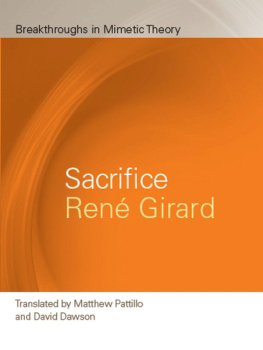
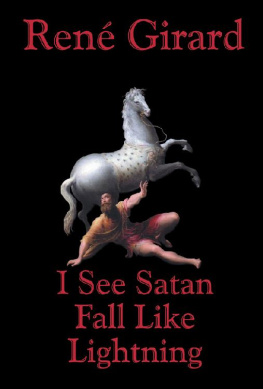
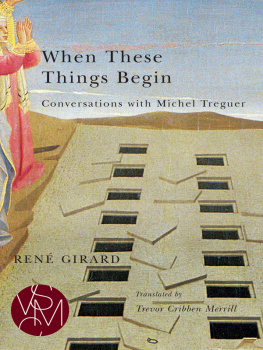


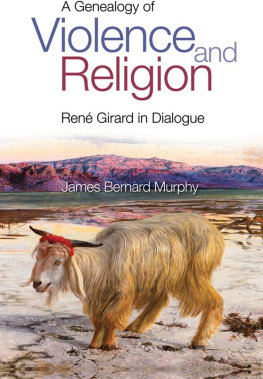


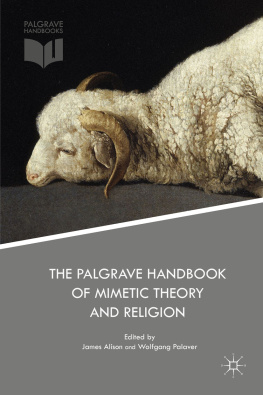

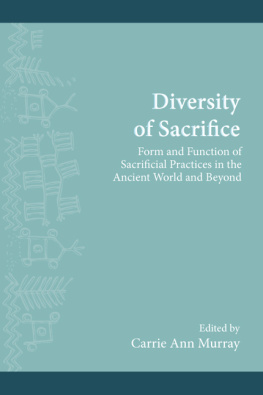


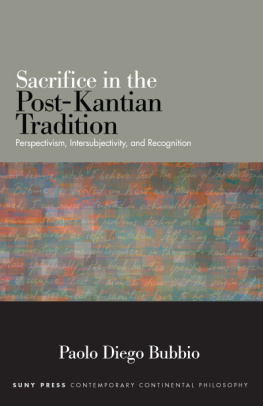
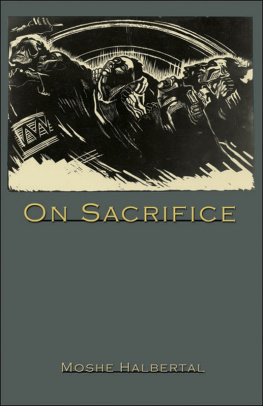

 The paper used in this publication meets the minimum requirements of ANSI/NISO Z39.48-1992 (R 1997) (Permanence of Paper).
The paper used in this publication meets the minimum requirements of ANSI/NISO Z39.48-1992 (R 1997) (Permanence of Paper). Michigan State University Press is a member of the Green Press Initiative and is committed to developing and encouraging ecologically responsible publishing practices. For more information about the Green Press Initiative and the use of recycled paper in book publishing, please visit www.greenpressinitiative.org.
Michigan State University Press is a member of the Green Press Initiative and is committed to developing and encouraging ecologically responsible publishing practices. For more information about the Green Press Initiative and the use of recycled paper in book publishing, please visit www.greenpressinitiative.org.